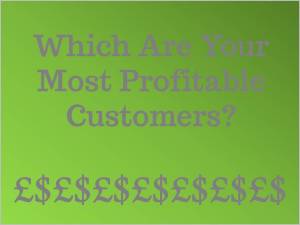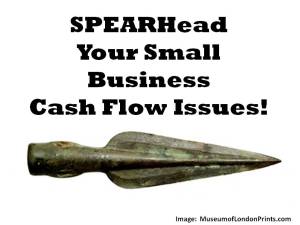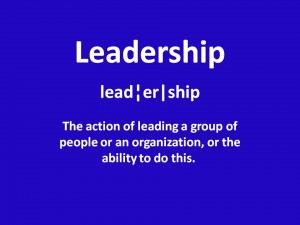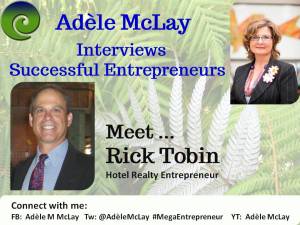Which Are Your Most Profitable Customers?
I regularly ask my coaching clients the following three questions:
- How many customers do you have?
- Which customers are the most profitable for your business?
- Which customers do you enjoy working with the most and why?
The last question is the easiest for my clients to answer because they can give me an emotional response rather than a fact-based response. The first two questions require analysis of their business, and most of my clients have usually not done that prior to meeting me.
I find that most businesses I work with have never actively thought about the profile of the customer they would like for their business. In pondering this issue, I devised a four quadrant approach to customer profitability and management. I call it my ‘L⁴ Customer Profitability Quadrant’.
Understanding the L⁴ Customer Profitability Quadrant’s power in relation to your business will require spending a bit of time working out the numbers. The gross margin for each customer needs to be calculated as follows:
Customer Gross Margin = Total Customer Sales – COGS for Customer/ Total Customer Sales x 100
So for instance, if Customer 24 buys $2000 of services in one year, and the cost of goods sold is $900, then the equation is:
Customer 24 Gross Margin = 2000-900/2000 x 100 = 55 percent
Using my example above, the customer gross margin calculation means that with the combination of products and services sold to Customer 24, the gross margin is 55 percent.
Another way of stating this is that for every $1000 of sales made to Customer 24, $550 contributes to the business’s gross profit.
We then rank all customers for enjoyment with 1 being low enjoyment and difficult to work with, and 10 being very enjoyable and easy to work with.
Once this information has been determined it is plotted to create the L⁴ Customer Profitability Quadrant as depicted in Table A.
Customers fall into four quadrants.
In the bottom left quadrant are the customers that are low in profitability and enjoyment, so I call this the ‘Lose Them’ quadrant.
In the top left quadrant we have highly profitable customers, but the enjoyment factor is low. I call this the ‘Look Out’ quadrant.
In the bottom right quadrant, are the customers that are really enjoyable to work with but they are not very profitable to the business. I call this the ‘Lift Up’ quadrant.
In the top right quadrant are the customers that are highly profitable and are highly enjoyable to work with. I call this the ‘Lots More’ quadrant.
‘Lose Them’ Quadrant
I wonder how many businesses have customers that are really hard going and not very profitable to the business? This type of customer sucks the life out of the business. Because this type of customer is difficult to work with, they will also often be time consuming to service. Having to work with customers that fall in this category is a waste of time and energy. That time and energy would be better spent working with enjoyable and profitable customers and finding more profitable customers for the business.
‘Look Out’ Quadrant
Customers that sit in the ‘Look Out’ quadrant are a challenge and risk to a business. They are highly profitable, but they are not enjoyable to work with. As this is a high risk quadrant, personally I don’t think any business should have too many customers sitting in it. Rather, they need to be moved to the ‘Lots More’ quadrant or out of your business.
The challenge with these customers is the profit they contribute to your business, notwithstanding the low enjoyment factor. If these customers were to leave your business, it potentially results in a major impact on profitability. Yet, because the enjoyment factor is low, there is a real chance they may not be loyal to your business, so there is a flight risk; they could find another supplier at any time and therefore impact the turnover and profitability of your business anyway.
‘Lift Up’ Quadrant
Customers in this ‘Lift Up’ quadrant pose a quandary for your business. They are good customers to deal with and service, and are probably highly loyal to your business, yet they are not very profitable. Often, because these customers are good to deal with, your staff will ‘over service’ them in order to maintain the interaction, because it is enjoyable.
This is actually an easy dilemma to resolve. These ‘Lift Up’ customers are already wedded to your business, so given the opportunity the chances are very high that they will want to buy more from you. Often customers are not aware of the full range of products offered by a business, or the business has not considered the full requirements of the customer in making offers. Depending on your business, the easiest way to address this situation is to find out more about what your customers do and what they might need from your business, and make offers.
‘Lots More’ Quadrant
These customers are your goldmines, and should be treated like kings and queens. They are highly profitable to your business, and they are enjoyable to work with.
The key here is to analyse what makes them enjoyable to work with: is it the company; the industry; the type of products and services they buy?
Once you have analysed this for your business, you can start working on targeting more of the same types of customers to your business.
Finally…
If you would like to read more about my L⁴ Customer Profitability Quadrant and how it could be applied to your business, then please go to www.adelemclay.com/free-resources and download the FREE E-book entitled: Who Are you Most Profitable Customers? This resource will help you to fully understand the nature of your customers and find ‘Lots More’ highly profitable and enjoyable customers for your business.
Could some guidance from me be helpful to you? If so, please arrange a free 30 mins Skype strategy meeting with me. Here’s my calendar to book a meeting. I’d love to support you in some way to gain ‘seductive clarity’ in any aspect of your business or life.
Other articles on Branding, Marketing and Pricing:
Increase Your Prices and Make More Profit
Do You Compete on Price? Bad Business Decision!!
Is Customer Service YOUR Key to Business Success?
Creating Superior Customer Value – do you do that in your business?
Finding Customers via LinkedIn
Using YouTube for Finding Customers
Who Wants High Customer Retention?
What is a Customer?
What is Business Marketing?
What’s your Personal Brand?











